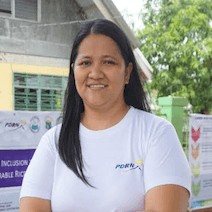SUMMARY
This is AI generated summarization, which may have errors. For context, always refer to the full article.
![[OPINION] So you want to be a humanitarian worker: A message from the frontlines](https://www.rappler.com/tachyon/r3-assets/612F469A6EA84F6BAE882D2B94A4B421/img/5BF0351479534B1DA656DA55BAFDD471/ngo-worker-august-14-2019.jpg)

It’s been more than 15 years since I began my journey as a frontline humanitarian responder. My work tends to take me all over the Philippines whenever disasters or armed conflicts strike. I am a licensed teacher by profession and my much younger self could not have forecasted the series of events that would lead me to where I am now.
It all began in 2003 when Oxfam, an international development and humanitarian organization, carried out a gender audit among its partners to find out if internal systems and practices promote gender equality. This type of audit, which I see as an opportunity for organizations to reflect if they are indeed fulfilling their commitments to end discrimination and live out the “do no harm” principle, is very important in the humanitarian sector, which still tends to be male-dominated. In some contexts, opportunities for women to take on leadership roles are still quite limited.
Shortly after the gender audit, the People’s Disaster Risk Reduction Network (PDRRN) announced a vacancy for the role of project assistant. They made it clear that the position will be offered to a woman because they wanted to address gender imbalances in staffing. The work primarily involved field monitoring, data gathering, food and non-food relief operations, and evacuation center management. It was an opportunity I could not pass up. Thankfully, I got the job.
As PDRRN’s mission evolved from serving communities in Pampanga to relief operations across the Philippines, my role also changed. PDRRN is also part of the Humanitarian Response Consortium (HRC) composed of 12 local humanitarian organizations. I rose through the ranks and I am now a deployable response manager. I led the HRC’s response for Typhoon Nina in 2016 and Typhoon Urduja in 2017 – both of which happened during the Christmas season.
Life as a humanitarian worker is rewarding but, just like any other job, it can have its ups and downs. My father passed away 3 months before Christmas in 2017. It was a heartbreaking decision for me to leave my grieving mother behind when Typhoon Urduja hit Biliran Island in the Visayas. I chose to lead the response because I developed close ties to the communities and I knew the area well, having lived thereabouts during the Typhoon Yolanda emergency response in 2013. My mother understood. She was proud of me.

In a high-tension, fast-paced environment, no single day is the same. As a woman assuming a leadership role in a cross-cultural and gender-diverse team, misunderstandings do occur from time to time. I stand firm that humanitarian relief efforts that respect local culture and traditions are the most effective. I am not saying that harmful practices should be condoned, but genuine partnerships can only start with working with what is there and respecting the way of life of the community we are trying to help. Having a common goal is what unites everyone at the end of the day.
I have learned many lessons along the way. Women have huge roles to play throughout the different phases of disaster response. For example, barangay health workers, mobilizers and teachers – who tend to be women – are the community’s first sources of information. They also provide crucial input during rapid needs assessments which the government and humanitarian organizations rely on to determine what kind of support to give.
Despite balancing multiple roles in their respective families, women are also the ones who are first to assume unpaid care work responsibilities in rebuilding their communities.
My message to anyone reading this who might be thinking about pursuing a career in the humanitarian sector: We must never forget the essence of humanitarian work – to uphold people’s dignity, especially of women and girls. Whatever you do, when you do it with and for women, you make things better for everyone, and not just for women.
I look forward to seeing you on the frontlines with me. – Rappler.com
Anna Ria S. Barrera is the Advocacy Officer and acts as Response Manager of the People’s Disaster Risk Reduction Network, a Pampanga-based nonprofit organization established in 1991 that works in partnership with the most vulnerable population groups to effectively protect them from harm during emergencies and disasters.
Add a comment
How does this make you feel?
![[In This Economy] Is the Philippines quietly getting richer?](https://www.rappler.com/tachyon/2024/04/20240426-Philippines-quietly-getting-richer.jpg?resize=257%2C257&crop=194px%2C0px%2C720px%2C720px)
![[In This Economy] A counter-rejoinder in the economic charter change debate](https://www.rappler.com/tachyon/2024/04/TL-counter-rejoinder-apr-20-2024.jpg?resize=257%2C257&crop=267px%2C0px%2C720px%2C720px)
![[Vantage Point] Joey Salceda says 8% GDP growth attainable](https://www.rappler.com/tachyon/2024/04/tl-salceda-gdp-growth-04192024.jpg?resize=257%2C257&crop_strategy=attention)
![[ANALYSIS] A new advocacy in race to financial literacy](https://www.rappler.com/tachyon/2024/04/advocacy-race-financial-literacy-April-19-2024.jpg?resize=257%2C257&crop_strategy=attention)

There are no comments yet. Add your comment to start the conversation.